review unit12
北师大版(一起)三年级下册《Unit 12 Review》 同步练习卷(1)

北师大版(一起)三年级下册《Unit 12 Review》小学英语-有答案-同步练习卷(1)一、选择题1. Is this your mother ? _________.()A.Yes , he is.B.Yes , she is.C.No, he isn't.2. My uncle _________ Japan.()A.is frome fromes in3. Here is a photo _________ my family.()A.ofB.forC.in4. Susan's aunt _________ Japan.()A.ises fromes in5. ﹣﹣What's the matter?﹣﹣My arm hurts.()A. B.6. Does he like noodles?()A.No,he doesn't. B.Yes,I do.7. father______(口语形式)()A.mom B.dad二、选择正确的译文.Good morning()A.早上好 B.下午好Nice to see you again.()A.很高兴见到你 B.很高兴再次见到你This is a chair.()A.这是一张桌子 B.这是一把椅子I have a storybook.()A.我有一本英语书 B.我有一本故事书This is my classroom.()A.这是我的教室 B.这是我的学校三、动手选一选.(选择恰当的单词填空)动手选一选(1)________(2)________A. small B. big动手选一选(1)________A. eyes B. ear四、选择每组中不同类的单词,将其序号填在括号里.选择每组中不同类的单词,将其序号填在括号里.()A.where A选择每组中不同类的单词,将其序号填在括号里.()A.he B.she C.new选择每组中不同类的单词,将其序号填在括号里.()A.grandma B.grandpa C.ice﹣cream选择每组中不同类的单词,将其序号填在括号里.()A.girl B.boy C.teacher选择每组中不同类的单词,将其序号填在括号里.()A.studentB.pupilC.he五、看单词,找规律,想一想横线上应该填什么词.看单词,找规律,想一想横线上应该填什么词.one,two,three,four,________看单词,找规律,想一想横线上应该填什么词.one,three,five,seven,________看单词,找规律,想一想横线上应该填什么词.ten,eight,six,________看单词,找规律,想一想横线上应该填什么词.one,two,three,five,________看单词,找规律,想一想横线上应该填什么词.eleven,nine,seven,________六、看图写单词.看图写单词.________看图写单词.________看图写单词.________看图写单词.________看图写单词.________七、按要求写单词按要求写单词(1)friend(复数形式)________(2)big(反义词)________(3)panda(复数形式)________(4)kite(复数形式)________按要求写单词(1)swim(现在分词)________(2)fly(现在分词)________(3)week(复数形式)________(4)twenty(上个数字)________八、填空.填空与翻译I have________orange.填空与翻译________you have a radio?填空与翻译She________(有) a magazine.填空.﹣﹣Do you have a magazine?﹣﹣No, I________.填空与翻译﹣﹣What are you________(do)?﹣﹣I'm________(sell) things.九、按顺序写出下面所缺字母的大小写.按顺序写出下面所缺字母的大小写.Aa________Hh十、阅读短文,选择正确答案me. My father is a worker. He likes going swimming.My mother is a teacher. She teaches Chinese in a primary school. She likes designing clothes. Jack is my brother. He likes playing football and singing.(1)How many members are there in my family ?________A. FiveB. FourC. Two..(2)What's Jack's father's job?________A. He is an engineer.B. He is a worker.C. He is a teacher.D. H e is a designer..(3)What's Jack's mother's job?________A. She is an engineer.B. She is a worker.C. She is a teacher.D. She is a designer.参考答案与试题解析北师大版(一起)三年级下册《Unit 12 Review》小学英语-有答案-同步练习卷(1)一、选择题1.【答案】B【考点】一般疑问句Review【解析】这位是你的妈妈吗?是的,她是.【解答】本题主要考查一般疑问句.问句"Is this your mother?"意思为:这位是你的妈妈吗?句子是一般疑问句.用yes或者no作答.主语为your mother,可以用人称代词she代替,肯定回答为:Yes,she is.B选项符合题意.故选:B.2.【答案】A【考点】动词短语Review【解析】我叔叔来自日本.【解答】本题考查短语.根据题干信息提示可知,句意为:我叔叔来自日本.选项A译为:来自.选项B译为:来自,但是come和主语"我叔叔"的人称不符,应该为comes.选项C译为:进来.故选:A.3.【答案】A【考点】介词Review【解析】这是一张我家人的照片.考查介词.A.of属于.B.for为了.C.in在…里.a photo of"一张…的照片"固定搭配.故选:A.4.【答案】B【考点】一般现在时,动词单数第三人称Review【解析】Susan的姑姑来自日本.【解答】本题考查动词的第三人称单数.根据题干信息提示可知,句意为:Susan的姑姑来自日本.选项A,is译为是,句子逻辑不对;选项B,comes from译为来自,时态正确;选项C,comes in译为进来,不符句意.故选:B.5.【答案】本题考查看图完成句子.题干译为"怎么了?我胳膊受伤了".从图A可以看出女孩的胳膊受伤了,从图B可以看出男孩的手指受伤了.故图A符合题意.故选:A.【考点】看图完成句子Review【解析】怎么了?我胳膊受伤了.【解答】本题考查看图完成句子.题干译为"怎么了?我胳膊受伤了".从图A可以看出女孩的胳膊受伤了,从图B可以看出男孩的手指受伤了.故图A符合题意.故选:A.6.【答案】答案:A.本题考查一般疑问句的回答.题干是助动词Does引导的一般疑问句,它的回答分为肯定回答和否定回答两种,肯定回答用"Yes,主语+助动词",否定回答用"No,主语+助动词+not".主语是he,B选项中主语是I,所以排除,故答案为A.【考点】一般疑问句Review【解析】他喜欢面条吗?答案:A.本题考查一般疑问句的回答.题干是助动词Does引导的一般疑问句,它的回答分为肯定回答和否定回答两种,肯定回答用"Yes,主语+助动词",否定回答用"No,主语+助动词+not".主语是he,B选项中主语是I,所以排除,故答案为A.7.【答案】考查同义词.A选项mom"妈妈";B选项dad"爸爸".两个选项均为对于父母口语化的表达,即日常生活中的称呼.father为dad的正式用语.故选:B.【考点】同义词Review【解析】爸爸、父亲【解答】考查同义词.A选项mom"妈妈";B选项dad"爸爸".两个选项均为对于父母口语化的表达,即日常生活中的称呼.father为dad的正式用语.故选:B.二、选择正确的译文.【答案】答案:A.该题考查英译汉.Good morning早上好.下午好Good afternoon.故选:A.【考点】英译汉Review【解析】Good morning早上好.【解答】答案:A.该题考查英译汉.Good morning早上好.下午好Good afternoon.故选:A.【答案】答案:B本题主要考查英译汉.Nice to see you很高兴见到你,again再次.结合整句与中文的表达习惯,故翻译为"很高兴再次见到你.".故选B.【考点】英译汉Review【解析】很高兴再次见到你.【解答】答案:B本题主要考查英译汉.Nice to see you很高兴见到你,again再次.结合整句与中文的表达习惯,故翻译为"很高兴再次见到你.".故选B.本题主要考查英译汉.This这,is是,a chair一把椅子.结合整句与中文的表达习惯,整句翻译为:这是一把椅子."桌子"译为"table".故选:B.【考点】英译汉Review【解析】这是一把椅子.【解答】本题主要考查英译汉.This这,is是,a chair一把椅子.结合整句与中文的表达习惯,整句翻译为:这是一把椅子."桌子"译为"table".故选:B.【答案】本题主要考查英译汉.I我,have有,a storybook一本故事书.结合整句与中文的表达习惯,整句翻译为:我有一本故事书."英语书"译为"English book".故选:B.【考点】英译汉Review【解析】我有一本故事书.【解答】本题主要考查英译汉.I我,have有,a storybook一本故事书.结合整句与中文的表达习惯,整句翻译为:我有一本故事书."英语书"译为"English book".故选:B.【答案】本题主要考查英译汉.This这,is是,my classroom我的教室.结合整句与中文的表达习惯,整句翻译为:这是我的教室."学校"译为"school".故选:A.【考点】英译汉Review【解析】这是我的教室.【解答】本题主要考查英译汉.This这,is是,my classroom我的教室.结合整句与中文的表达习惯,整句翻译为:这是我的教室."学校"译为"school".故选:A.三、动手选一选.(选择恰当的单词填空)【答案】B,A【考点】看图完成句子【解析】我是一个大女孩.我是一只小狗.【解答】本题考查看图完成句子.题干译为"我是一个…女孩.我是一只…狗."从图片可以看出狗很小,女孩相比狗来说体型较大.故推测句意为"我是一个大女孩.我是一只小狗"."大"译为"big"."小"译为"small".故答案为:B;A.【答案】A【考点】看图完成句子Review【解析】我不能睁开我的眼睛.我也是.【解答】本题考查看图完成句子.题干译为"我不能睁开我的…"从图片可以看出风很大,小女孩闭着眼睛.故推测句意为"我不能睁开我的眼睛"."眼睛"译为"eyes".故答案为:A.四、选择每组中不同类的单词,将其序号填在括号里.【答案】A【考点】词性分类Review【解析】A.where在哪;B.UK英国;C.USA美国.【解答】本题考查词性分类.A.where在哪;B.UK英国;C.USA美国.UK和USA是国家名词,where是疑问副词.故选:A.【答案】C【考点】词性分类Review【解析】he他;she她;new新的.【解答】本题考查词性分类.A.he他;B.she她;C.new新的.he和she是人称代词主格,new是形容词.C【考点】类别分类Review【解析】A.grandma奶奶;B.grandpa爷爷;C.ice﹣cream冰激凌.【解答】本题考查类别分类.A.grandma奶奶;B.grandpa爷爷;C.ice﹣cream冰激凌.A,B选项是家庭成员名词,C选项是食物类名词.故选:C.【答案】C【考点】类别分类Review【解析】A.girl女孩;B.boy男孩;C.teacher教师.【解答】本题考查类别分类.A.girl女孩;B.boy男孩;C.teacher教师.A,B选项是人物名词,C选项是职业名词.故选:C.【答案】C【考点】词性分类Review【解析】A.student学生;B.pupil小学生;C.he他.【解答】本题考查词性分类.A.student学生;B.pupil小学生;C.he他.student和pupil是名词,he是人称代词主格.故选:C.五、看单词,找规律,想一想横线上应该填什么词.【答案】five【考点】类别分类Review【解析】one一;two二;three三;four四;five五.【解答】本题考查类别分类.one表示"一".two表示"二".three表示"三".four表示"四".可知这几个单词是表示数目的数词,是从"一"开始,一个接一个的自然数,因此"四"后面应是"五"."五"用five表示.故答案为:five.【答案】nine【考点】类别分类Review【解析】one一;three三;five五;seven七;nine九.【解答】本题考查类别分类.one表示"一".three表示"三".five表示"五".seven表示"七".这四个单词是表示数目的词,而且后一个数等于前一个数加2."7+2=9","9"用nine表示.故答案为:nine.【答案】four【考点】类别分类Review【解析】ten十;eight八;six六;four四.【解答】本题考查类别分类.ten十;eight八;six六;根据题目所给数词,可知规律是后面的数词比前一个数词小2,所以横线处应填写four(四).故答案为:four.【答案】six【考点】类别分类Review【解析】one一,two二,three三,five五.【解答】考查类别分类.one一,基数词,two二,基数词,three三,基数词,five五,基数词,six六,基数词,与题干属于一类.故答案为:six.【答案】five【考点】类别分类Review【解析】eleven十一;nine,九;seven七.【解答】本题考查类别分类.eleven十一;nine,九;seven七;根据题目所给的数词,可知规律是后面的数词比前面的数词小2.故答案为:five.六、看图写单词.【答案】library【考点】看图识词Review【解析】图书馆【解答】考查看图识词.图片是图书馆,译为:library.故答案为:library.【答案】potatoes【考点】看图识词Review【解析】土豆【解答】考查看图识词.图片是土豆,译为:potato,很多土豆应用复数形式potatoes.故答案为:potatoes.【答案】cow【考点】看图识词Review【解析】奶牛【解答】考查看图识词.图片是奶牛,译为:cow.故答案为:cow.【答案】store【考点】看图识词Review【解析】商店【解答】考查看图识词.图片是商店:译为:store.故答案为:store.【答案】glasses【考点】看图识词Review【解析】眼镜【解答】考查看图识词.图片是眼镜,译为:glasses.故答案为:glasses.七、按要求写单词【答案】friends,small,pandas,kites【考点】可数名词及其单复数反义词、对应词Review【解析】(1)friend朋友.(2)big大的.(3)panda熊猫.(4)kite风筝.【解答】(1)本题考查可数名词单复数.friend译为:朋友.复数形式为:friends.故答案为:friends.(2)本题考查反义词.big译为:大的.反义词译为小的,即small.故答案为:small.(3)本题考查可数名词单复数.panda译为:熊猫.复数形式为:pandas.故答案为:pandas.(4)本题考查可数名词单复数.kite译为:风筝.复数形式为:kites.故答案为:kites.【答案】swimming,flying,weeks,nineteen【考点】可数名词及其单复数物主代词Review【解析】(1)swim游泳.(2)fly飞.(3)week星期.(4)twenty二十.【解答】(1)swimming.考查动词的现在分词.动词swim的现在分词是先双写"m",再加﹣ing.故答案为:swimming.(2)flying.考查动词的现在分词.动词fly的现在分词是直接在词尾加﹣ing.故答案为:flying.(3)weeks.考查可数名词及其单复数.week是可数名词,复数是在词尾加﹣s.故答案为:weeks.(4)nineteen.考查词汇.twenty表示"二十",上一个数字是"十九",对应单词是nineteen.故答案为:nineteen.八、填空.【答案】an【考点】完成句子ReviewMocky's store【解析】我有一颗橘子.【解答】该题考查完成句子.主语是I,谓语是have,宾语是orange,且orange是单数,故前面需加不定冠,orange以原因音素开头,故用an.故答案为:an.【答案】Do【考点】完成句子ReviewMocky's store【解析】你有一个收音机吗?【解答】该题考查完成句子.根据问号,可知这是一个疑问句,主语是you,谓语是have,宾语是a radio,主谓宾都有,不缺成分,故是一个一般疑问句,助动词用Do.故答案为:Do.【答案】has【考点】翻译能力ReviewMocky's store【解析】她有一份杂志.【解答】考查翻译填空.根据句意:她有一份杂志.是事实,所以时态是一般现在时,主语she 是第三人称单数,"有"用have,要用第三人称单数形式的has.故答案为:has.【答案】don't【考点】完成句子Review【解析】你有杂志吗?不,我没有.【解答】考查完成句子."do"助动词,表示句子是一般现在时,放在句首构成一般现在时,句子是"you",回答用"I",肯定回答用"Yes,I do",否定回答用"No,I don't",结合要求,组织句子.故答案为:don't.【答案】doing,selling【考点】单词、词组ReviewMocky's store【解析】你在做什么?我在卖东西.【解答】考查单词填空.根据题干:第一个空前面有are,后面要用现在分词构成现在进行时,所以用doing,第二个空回答也要用现在进行时,构成是be doing,所以用selling.故答案为:doing;selling.九、按顺序写出下面所缺字母的大小写.【答案】BbCcDdEeFfGg【考点】字母书写Review【解析】Aa Bb Cc Dd Ee Ff Gg Hh【解答】考查字母的书写.Aa到Hh的顺序为Aa Bb Cc Dd Ee Ff Gg Hh.四线格中,大写字母占中上格,小写字母a,c,e占中格;b,d,h占中上格;g占中下格;f占上中下三格.故答案为:十、阅读短文,选择正确答案【答案】ABC【考点】文中细节Review【解析】在我的家庭中有五名成员﹣﹣我的父母、我的哥哥、我的宠物Spot和我.我的爸爸是一名工人.他喜欢游泳.我的妈妈是一名老师.她在一所小学教语文.她喜欢设计衣服.Jack是我的哥哥.他喜欢踢足球和唱歌.【解答】(1)A.由题,How many members询问家庭中成员的数量.由文中There are five members in my family "在我的家庭中有五名成员"得知是"五"five.故选:A.(2)B.由题,询问Jack的爸爸的工作.由文中My father is a worker."我的爸爸是一名工人."得知是一名"工人"worker.故选:B.(3)C.由题,询问Jack的妈妈的工作.由文中My mother is a teacher."我的妈妈是一名老师."得知是一名"老师"teacher.故选:C.。
新版(人教版)七年级(下)英语Unit12课文详解

Unit 12 What did you do last weekend?Section A 2a — 2d (P68)* 教师寄语:If you want to understand today, you have to search yesterday.想要懂得今天,就必须研究昨天。
【学习目标】【学习重点】:继续学习谈论过去事件; 学会用疑问词who, what, when。
【体验学习】:预习交流1.根据图片和对话等,预测新课内容;2.根据音标拼读单词并牢记;3.自学课文,勾画出重点和疑惑。
翻译官visit my grandma_______________ 2.备考_____________________3. work as a guide _________________4. over______________________5. How interesting! ________________6. living habit_________________7. kind of _______________________ 8. 熬夜_____________________【课堂导学】:I、新课呈现Step1 Review and Lead-inQuick action: The phrases in 1a or the past forms of the verbs.Step2 PresentationShow some pictures, ask and learn. eg:--What did you/he/ she/they do? --Where did you/he/she/they go?--Who…?Step3 Listening1. Go through the sentences in 2a.2. Listen to 2a and underline the words you hear.3. Listen again. Write C for Carol, J for Jack or B for Becky next to the statements in 2b. Then check the answers.Step4 Pair workStudent A asks questions with who, what or where and Student B answers. Finish 2c. Role-play the conversations in 2d.II、合作交流Group work:模仿2d编写对话,谈论过去事件。
人教版七年级英语下册unit12优秀教案

人教版七年级英语下册unit12优秀教案全文共3篇示例,供读者参考篇1Unit 12 of the People's Education Edition Grade Seven English textbook covers the topic of art and creativity. In this unit, students will learn about different forms of art, discuss their favorite types of art, and participate in various creative activities to express themselves.To make the most of this unit, here is an excellent lesson plan that teachers can follow:Lesson 1: Introduction to ArtObjective: To introduce students to the concept of art and its different forms.Activities:1. Show examples of different types of art such as paintings, sculptures, and music.2. Brainstorm with students about what art means to them and what forms of art they enjoy.3. Discuss the importance of art in society and how it can bea form of self-expression.Lesson 2: Famous ArtistsObjective: To learn about famous artists and their works.Activities:1. Introduce students to well-known artists such as Leonardo da Vinci, Vincent van Gogh, and Pablo Picasso.2. Show pictures of their famous works and discuss the style and themes of their art.3. Have students choose a favorite artist and create a poster about their life and works.Lesson 3: Creating ArtObjective: To engage students in creative activities to express themselves.Activities:1. Provide art supplies such as paints, crayons, and paper for students to use.2. Encourage students to create their own artwork inspired by the styles of famous artists or their own imagination.3. Have a mini art exhibition in the classroom to showcase students' works.Lesson 4: Reflecting on ArtObjective: To reflect on the role of art in our lives and society.Activities:1. Have a class discussion about how art can inspire, entertain, and provoke emotions.2. Ask students to write a reflection on what art means to them and how they can incorporate more art into their lives.3. Watch a short video about the impact of art on society and discuss its importance.By following this lesson plan, teachers can effectively cover the content of Unit 12 and engage students in meaningful discussions and activities related to art and creativity. This will not only help students improve their English skills but also develop their appreciation for art and the creative process.篇2Unit 12 of the People's Education Press seventh grade English textbook is focused on the theme of "Life in the future".In this unit, students will learn how to talk about their future plans, aspirations, and predictions. Here is an excellent lesson plan for teaching Unit 12 of the textbook:Lesson Plan:Title: Life in the futureGrade: 7Unit: 12 (People's Education Press)Theme: Future plans, aspirations, and predictionsDuration: 2 lessons (90 minutes each)Objectives:- Students will be able to talk about their future plans using the simple future tense.- Students will be able to express their aspirations for the future.- Students will be able to make predictions about the future using future tense modal verbs.- Students will be able to write a short paragraph describing their future plans.Warm-up (15 minutes):- Begin the lesson by asking students to brainstorm and discuss what they think life will be like in the future. Encourage them to think about technology, education, careers, and daily life.- Play a short video or show pictures of futuristic inventions and ask students to describe what they see.Presentation (30 minutes):- Introduce the simple future tense to students and explain its formation (will + base verb).- Give examples of how to talk about future plans using the simple future tense.- Practice with students by asking them to talk about their own future plans using the simple future tense.- Introduce future tense modal verbs (will, might, may) for making predictions about the future.- Give examples of how to make predictions using future tense modal verbs.Practice (30 minutes):- Divide students into pairs and ask them to discuss and write down their future plans using the simple future tense.- Monitor and provide assistance as needed.- Ask some pairs to share their plans with the class.Production (15 minutes):- Ask students to write a short paragraph (5-7 sentences) describing their future plans using the simple future tense.- Provide a writing prompt to help guide students in their writing.- Allow students to share their paragraphs with the class.Review and Assessment (15 minutes):- Review key concepts and vocabulary from the lesson.- Ask students to complete a short quiz or worksheet to assess their understanding of the simple future tense and future tense modal verbs.- Provide feedback and address any misconceptions.Homework:- Assign students to write a diary entry about a day in their future life using the simple future tense.By following this lesson plan, students will be able to effectively communicate their future plans, aspirations, andpredictions in English. This lesson plan incorporates various activities to engage students and reinforce key language concepts related to the theme of "Life in the future" in Unit 12 of the People's Education Press seventh grade English textbook.篇3Unit 12: You’re supposed to shake handsTeaching Objectives:1. Students will be able to understand the cultural differences in greetings between different countries.2. Students will be able to use the target language for greetings appropriately.3. Students will be able to reflect on the importance of cultural understanding and respect.Teaching Procedures:Step 1: Warm-up (10 minutes)- Begin the class by showing a video clip of people from different cultures greeting each other. Ask the students to share their thoughts on the various greetings they saw.- Discuss the importance of greetings in different cultures and how they can vary from country to country.Step 2: Presentation (15 minutes)- Introduce the target language for greetings and practice pronunciation with the students.- Show a slideshow or video presentation of common greetings in different countries, emphasizing the cultural significance of each greeting.- Have students take notes on the different greetings and their cultural meanings.Step 3: Practice (20 minutes)- Divide the class into pairs or small groups and have them practice the target language greetings with each other.- Encourage students to think about the appropriate greetings for different situations (formal vs. informal, meeting strangers vs. meeting friends).- Monitor and provide feedback as needed.Step 4: Cultural Understanding (15 minutes)- Engage the students in a discussion about the importance of cultural understanding and respect when greeting others.- Ask students to reflect on a time when they may have misunderstood a greeting in a different culture and how they could have handled the situation better.- Encourage students to think about ways they can show respect for other cultures in their daily lives.Step 5: Review and Assessment (10 minutes)- Review the target language greetings with the whole class and assess student understanding through a quick quiz or game.- Encourage students to continue practicing their greetings outside of the classroom and to explore more about different cultures and their greetings.Homework:- Ask students to research a different culture and its traditional greetings, and to write a short reflection on what they learned.By following this detailed lesson plan, students will not only learn the target language for greetings but also gain a deeperunderstanding of the importance of cultural awareness and respect.。
Unit12第5课时 Section B (2a-2e)(教学课件)-九年级英语全一册(人教新目标)
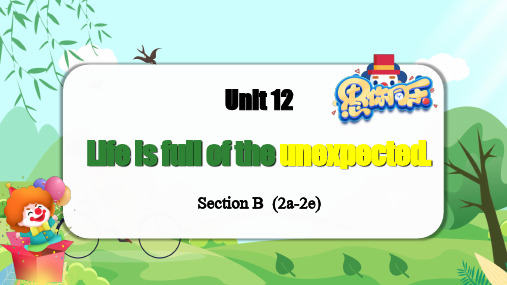
Discussion
A
What’s the structure of the passage?
✔B
C
Careful reading Read para. 1 carefully and complete the mind map.
April Fool’s Day is a celebration that takes place in different countries around the world. It happens on April 1st every year and is a day when many people play all kinds of tricks and jokes on each other.
Discussion
Do you want to get the special water?
Do you think the two stories are funny or sad?
Are all tricks funny all the time?
Careful reading
Read para. 3 carefully and answer the questions.
Do all the jokes and tricks happen only on April Fool's Day?
One of the world’s most famous tricks, however,
happened in October rather than in April. In that month in 1938, actor Orson Welles announced on his radio program that aliens from Mars had landed on
八年级英语下册 Unit12《Review》同步练习11 教科版EEC

Unit 12 Review一、固定词组、句型(或日常生活知识与交际用语)1.—Do you know Wang Nan wasn’t first in the singles?—__________ I thought she would never lose a game!A. Really?B. Great!C. All right.D. No problem.2. —Morning! _________, isn’t it?—Yes, but a bit cold.A. Hot weatherB. Cold weatherC. Bad dayD. Nice day3. —_____________. Hope is always around you.—Thank you, Miss Wang.A. Never give upB. Don’t be lateC. Don’t thank goodnessD. Never get so proud4. —Shall I book some seats for the concert?—_____________. I’ve already done that.A. Yes, you mayB. No, you mustn’tC. No, you needn’tD. I’d rather not5. The teacher asked us____ ___the work on time.A. finishB. to finishC. finishedD. finishes6. They______ all their money, so they have to walk home now.A. have spentB. spendC. spentD. are spending7. —______do you play computer games?—Once a week.A. How soonB. How oftenC. How longD. How many8. You look tired . __________ working indoors you should be out for a walk .A. Ahead ofB. Instead ofC. In front ofD. In spite of9. —Thank you so much for the book you sent me.—_______________A. No,thanks.B. I’m glad you like it.C. Please don’t say so.D. No, it is not so.10. —If you want to go out of a cinema,which sign should you follow?—It’s________.A. EXITB. ENTRANCEC. NOPARKING D. NO SMOKING11. —There’s something wrong with my radio.—_____. I can mend it for you.A. It’s not good for youB. You’re rightC. Nevermind D. That’s right12. _______people we help, ________we feel.A. Many; the more happilyB. The more; the happierC. All; the happiestD. Most; the most happy13. The heavy snow stopped them the village.A. from leaveB. from leftC. from leavingD. leave14.—_____ do you like Chinese food?—Very much.A. WhatB. WhyC.How D. For what15. _____ in England are between 9 a. m. and 5 p. m. except Saturday and Sunday.A. NO PHOTOSB. MEALSC. NO SMOKINGD. OFFICE HOURS二、被动语态1. Many old houses around our school _ __ next year and a large green area will appear.A. pull downB. will be pulled downC. will pull downD. are pulled down2. People have realized how important the environment is,but still trees ______in the world every year.A. were cut downB. cut downC. are cutdown D. will be cut down3. On May 30th, 2005, one bowl in the Ming dynasty(明朝) _______ at the price of 30.36 million Hong Kong dollars.A. sellB. soldC. is soldD. was sold4. Today computers _______ in both cities and towns.A. were usingB. are usedC. wereused D. are using5. Dad, the phone is ringing. I guess either you or Mum on the phone.A. is wantedB. are wantedC.wants D. want6. The letter_________ in French. I can't read it.A. writesB. wroteC. is writingD. is written7. The flowers________ every day. Or they’ll die.A. must waterB. can be wateredC. shouldwater D. must be watered8. —Doctor, it seems _ you like to work with animals.—Yes, I think animals should as our friends.A. that; regardB. that; be regardedC. what; regardD. what; be regarded9. —How often ______ your school sports meeting ______?—Once a year.A. does; holdB. was; holdC. is;held D. did; hold10. —Did you go to Sam’s weekend party?—No, I___________.A. am not invitedB. wasn’t invitedC. haven’t invitedD. didn’t invite三、定语从句1. The money will be used to help the people ____ 1ost their homes in the Tsunami (海啸).A. whoB. whoseC.which D. where2. —Do you know everybody ______ came to the party?—Almost, but I don’t know the one ______ you talked with near the door. A. who, / B. whose, that C. that,which D. /, whom3. The young lady _____ we met yesterday is our new maths teacher.A. whatB. whoseC.whom D. which4. Most of the people _____ lost their lives in the attacks are Americans.A. whenB. whoC.how D. which5. I have tried my best .That is all I can do for you .A. whoB. whichC.that D. how【试题答案】一、固定词组、句型(或日常生活知识与交际用语)1~5 ADACB 6~10 ABBBA 11~15 CBCCD二、被动语态1~5 BCDBA 6~10 DDBCB三、定语从句1~5 AACBC【励志故事】改变人生的一句话卡耐基小时候是个大家公认的非常淘气的坏男孩。
人教版九年级英语Unit 12 Life is full of the unexpected. 全单元教案
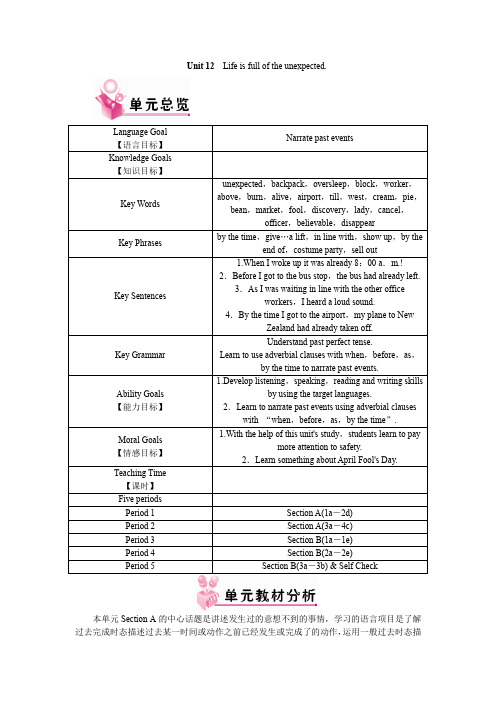
Unit 12Life is full of the unexpected.Language Goal【语言目标】Narrate past events Knowledge Goals【知识目标】Key Wordsunexpected,backpack,oversleep,block,worker,above,burn,alive,airport,till,west,cream,pie,bean,market,fool,discovery,lady,cancel,officer,believable,disappearKey Phrases by the time,give…a lift,in line with,show up,by the end of,costume party,sell outKey Sentences1.When I woke up it was already 8:00 a.m.! 2.Before I got to the bus stop,the bus had already left.3.As I was waiting in line with the other officeworkers,I heard a loud sound.4.By the time I got to the airport,my plane to NewZealand had already taken off.Key GrammarUnderstand past perfect tense.Learn to use adverbial clauses with when,before,as,by the time to narrate past events.Ability Goals 【能力目标】1.Develop listening,speaking,reading and writing skillsby using the target languages.2.Learn to narrate past events using adverbial clauses with “when,before,as,by the time”.Moral Goals 【情感目标】1.With the help of this unit's study,students learn to paymore attention to safety.2.Learn something about April Fool's Day.Teaching Time【课时】Five periodsPeriod 1Section A(1a-2d)Period 2Section A(3a-4c)Period 3Section B(1a-1e)Period 4Section B(2a-2e)Period 5Section B(3a-3b) & Self Check本单元Section A的中心话题是讲述发生过的意想不到的事情,学习的语言项目是了解过去完成时态描述过去某一时间或动作之前已经发生或完成了的动作,运用一般过去时态描述过去某个时间里发生的动作或存在的状态。
Unit 12 第6课时 Section B (教学课件)-九年级英语全一册(人教新目标)

While-writing
My lucky/ unlucky day
妙构思
开篇点题
I will always remember the date... This was the luckiest/ unluckiest day of my life...
阐述经历
When I woke up that morning... Later that day... I couldn’t believe... Then/After that,... Finally,...
3a
Can you remember a lucky or an unlucky day? What happened? Make some notes about what you remember.
Examples
catch the bus
rush out of the door run quickly / fast to catch the bus be out of breath after my run
• Finally, …
• I think … • What a lucky/an unlucky day!
总结感慨
While-writing
单元话题导语
本单元以“unexpected events”为话题展开学习, 重点学习了语法——过去完成时态。该话题涉及内容 较多,可以讲述自己的亲身经历,也可以讲述自己 的亲眼所见或亲耳所闻。话题命题形式常采用语言 描述形式,涉及日记、记叙文等文体。具体到本单 元书面表达中,要求同学们能运用一般过去时和过 去完成时描述自己或他人的经历。
While-writing
Sample Writing 1
六年级英语上册 Unit 12 Review Lesson One重难点归纳 教科版
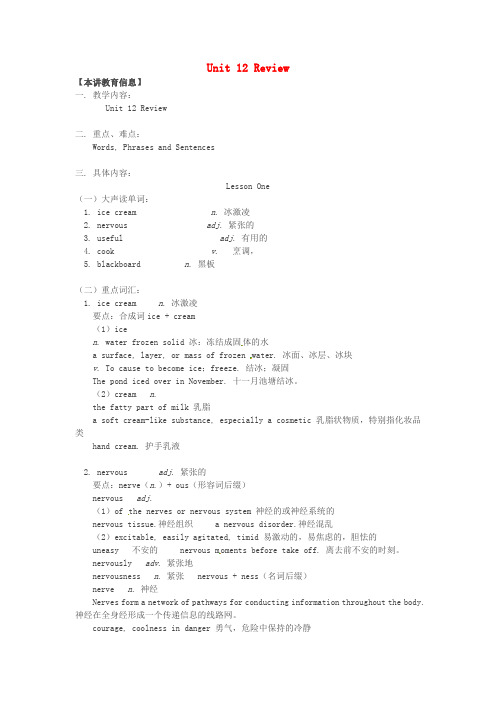
Unit 12 Review【本讲教育信息】一. 教学内容:Unit 12 Review二. 重点、难点:Words, Phrases and Sentences三. 具体内容:Lesson One(一)大声读单词:1. ice cream n.冰激凌2. nervous adj.紧张的3. useful adj.有用的4. cook v.烹调,5. blackboard n.黑板(二)重点词汇:1. ice cream n.冰激凌要点:合成词ice + cream(1)icen. water frozen solid 冰:冻结成固体的水a surface, layer, or mass of frozen water. 冰面、冰层、冰块v. To cause to become ice;freeze. 结冰;凝固The pond iced over in November. 十一月池塘结冰。
(2)cream n.the fatty part of milk 乳脂a soft cream-like substance, especially a cosmetic 乳脂状物质,特别指化妆品类hand cream. 护手乳液2. nervous adj.紧张的要点:nerve(n.)+ ous(形容词后缀)nervous adj.(1)of the nerves or nervous system 神经的或神经系统的nervous tissue.神经组织 a nervous disorder.神经混乱(2)excitable, easily agitated, timid 易激动的,易焦虑的,胆怯的uneasy 不安的 nervous m oments before take off. 离去前不安的时刻。
nervously adv.紧张地nervousness n.紧张 nervous + ness(名词后缀)nerve n.神经Nerves form a network of pathways for conducting information throughout the body. 神经在全身经形成一个传递信息的线路网。
三年级英语下册 unit 12 Review(2)课件 北师大(三起)

She anHe officenurse. an is a teacher. He is worker,too. is worker. He is is Sheis aadorctor. office a cook. She They are students.
In a hospital.
What does his mother do? ___________________
A teacher.
Is Rose a student? _____________________
No.
Who looks after Rose? _____________________
2a
My Family My name is Peter. I come from the U.S.A. I am twelve years old. I’m a student in Grade Seven. I have a happy family. We live in Beijing now. My father is a doctor. He works in a hospital. My mother is a teacher. She teaches in a high school. My little sister, Rose, is only four years old. She is very cute. My grandparents live with us and look after Rose at home.
人教版七年级英语下册课程纲要
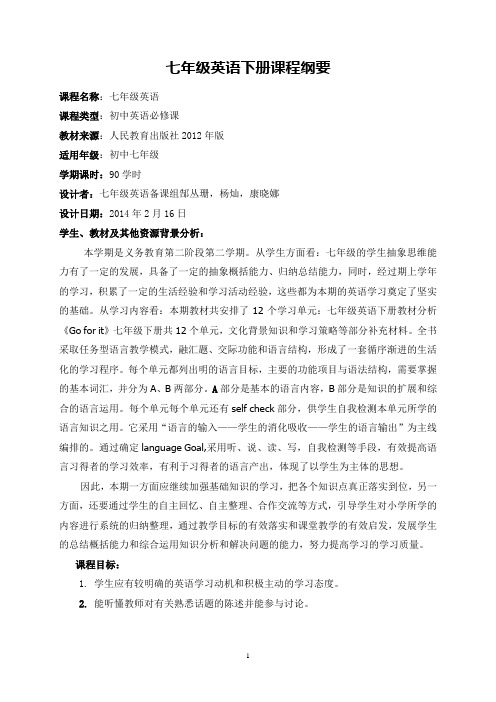
七年级英语下册课程纲要课程名称:七年级英语课程类型:初中英语必修课教材来源:人民教育出版社2012年版适用年级:初中七年级学期课时:90学时设计者:七年级英语备课组郜丛珊,杨灿,康晓娜设计日期:2014年2月16日学生、教材及其他资源背景分析:本学期是义务教育第二阶段第二学期。
从学生方面看:七年级的学生抽象思维能力有了一定的发展,具备了一定的抽象概括能力、归纳总结能力,同时,经过期上学年的学习,积累了一定的生活经验和学习活动经验,这些都为本期的英语学习奠定了坚实的基础。
从学习内容看:本期教材共安排了12个学习单元:七年级英语下册教材分析《Go for it》七年级下册共12个单元,文化背景知识和学习策略等部分补充材料。
全书采取任务型语言教学模式,融汇题、交际功能和语言结构,形成了一套循序渐进的生活化的学习程序。
每个单元都列出明的语言目标,主要的功能项目与语法结构,需要掌握的基本词汇,并分为A、B两部分。
A部分是基本的语言内容,B部分是知识的扩展和综合的语言运用。
每个单元每个单元还有self check部分,供学生自我检测本单元所学的语言知识之用。
它采用“语言的输入——学生的消化吸收——学生的语言输出”为主线编排的。
通过确定language Goal,采用听、说、读、写,自我检测等手段,有效提高语言习得者的学习效率,有利于习得者的语言产出,体现了以学生为主体的思想。
因此,本期一方面应继续加强基础知识的学习,把各个知识点真正落实到位,另一方面,还要通过学生的自主回忆、自主整理、合作交流等方式,引导学生对小学所学的内容进行系统的归纳整理,通过教学目标的有效落实和课堂教学的有效启发,发展学生的总结概括能力和综合运用知识分析和解决问题的能力,努力提高学习的学习质量。
课程目标:1.学生应有较明确的英语学习动机和积极主动的学习态度。
2.能听懂教师对有关熟悉话题的陈述并能参与讨论。
3.能读供七年级学生阅读的简单读物和报纸杂志,克服生词障碍,理解大意。
九年级英语Unit 12—教学设计【教学参考】
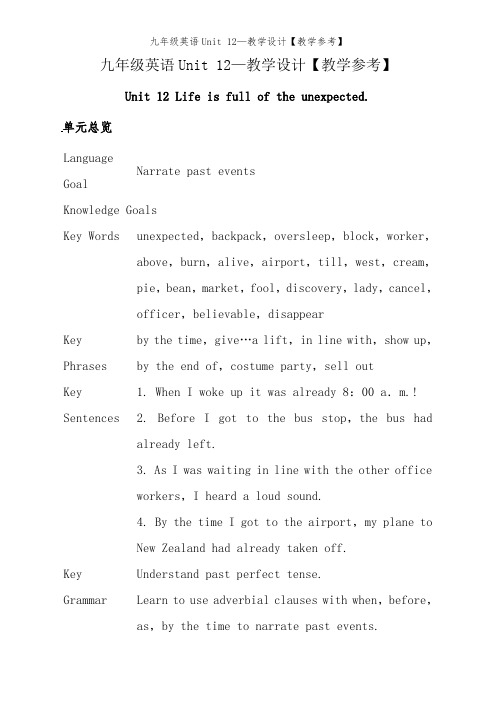
九年级英语Unit 12—教学设计【教学参考】Unit 12 Life is full of the unexpected.单元总览LanguageGoalNarrate past eventsKnowledge GoalsKey Words unexpected,backpack,oversleep,block,worker,above,burn,alive,airport,till,west,cream,pie,bean,market,fool,discovery,lady,cancel,officer,believable,disappearKey Phrases by the time,give…a lift,in line with,show up,by the end of,costume party,sell outKey Sentences 1. When I woke up it was already 8:00 a.m.!2. Before I got to the bus stop,the bus had already left.3. As I was waiting in line with the other office workers,I heard a loud sound.4. By the time I got to the airport,my plane to New Zealand had already taken off.Key Grammar Understand past perfect tense.Learn to use adverbial clauses with when,before,as,by the time to narrate past events.Ability Goals 1. Develop listening,speaking,reading and writing skills by using the target languages. 2. Learn to narrate past events using adverbial clauses with “when,before,as,by the time”.Moral Goals 1. With the help of this unit's study,students learn to pay more attention to safety.2. Learn something about April Fool's Day.TeachingTimeFive periods单元教材分析本单元Section A的中心话题是讲述发生过的意想不到的事情,学习的语言项目是了解过去完成时态描述过去某一时间或动作之前已经发生或完成了的动作,运用一般过去时态描述过去某个时间里发生的动作或存在的状态。
综合英语Unit 12 Why Are You So Smart

Outline of the text
Part 1 (1-2) Introduction of subject to be discussed, i.e. smart genes
Part 2 (3-21) Illustrations of the researches
Charles Spearman
The Different Ways of Being Smart
1. He or she is likely to be wellorganized, to go about solving problems in a logical, step-by-step fashion, and to have a highly developed language ability.
3. Once a heredity pattern for a trait is established, researchers can home in on the genes responsible.
Home in on: aim exactly towards a
target; be guided to a target automatically.
Suggest and propose in the next sentence have a
gerund as their object. e.g. He suggested our returning home as soon as
possible.
Scrap here means "abandon".
要在整个人类基因组中发现更小的基因成 分,普洛明就需要更多的人和上千倍的 DNA标记。
Unit 12 复习提升课件-【大单元教学】-七年级英语下册同步备课系列(人教版)

02
Phrases
8
Phrases
1. 搭起;举起 _p_u_t_u_p________
2. 对……大声喊叫_s_h_o_u_t_t_o______
3. 上上下下;起伏_u_p_a_n_d__d_o_w_n___
4. 把.….弄醒__w_a_k_e_._.._u_p____
5. 中学__m_i_d_d_le__s_c_h_o_o_l
A.Of
B.With
C.For
D.As
22
Exercises
5.We can’t __B______ others, but sometimes we have to ________ the old
to make them hear us.
A.shout to; shout at
B.shout at; shout to
谁的
16
05
Writing
17
Writing
假设你是宋刚,你和父母上周末去 北京旅游了。现在请你根据下表的 内容提示,给你的笔友Millie写一 封不少于60词的英语邮件,介绍你 们在北京的所见所闻。邮件的开头 已给出,不计入总词数。
18
Writing
19
Writing
Dear Millie, How was your vacation? My parents and I went to Beijing for a vacation last weekend. We had a good time there. On Saturday, we visited the Great Wall. We climbed it and saw beautiful scenery there. On Sunday morning, we went to the Summer Palace. We saw different kinds of flowers and a nice lake. It was so beautiful and it was just like an excellent painting. On Sunday afternoon, we went to Wangfujing Street and bought some gifts for my grandparents there. And then we came back home by train.
剑桥少儿英语一级下册知识点总结_1

剑桥少儿英语一级下册知识点总结---------------------------------------Unit1 School opening day . (Ⅰ)1.Words: 21个New: crayon toilet radiolemonade rubber exercise 已学: fruit colour animal ball paper water glasses book ruler toy car eraser cake pencil-case picture book2.Text: Hi! Tony. Nice to see you again . Niceto see you ,too. How?s your holiday ? It?s great.3.Chant4.Part 5 6 8 10Unit1 School opening day . (Ⅰ)1.Review Unit1(I): words text chant2.字母组合ee的发音3.Phrases: great an old friend help yourfriend introduce a new friend4.Part 1 4 7Unit2 Doing English in the classroom . (Ⅰ)1.Review some animal words :15个2.Text: What are house animals ? They aredogs and cats. What are zoo animals? They are crocodiles and snakes . What are farm animals ? They are horses and cows.3.字母组合ea的发音4.Part 1 2 3 4Unit2 Doing English in the classroom . (Ⅰ)1.Review Unit2(I): words text 组合发音2.Phrases: stand up Look right Look leftLook up Bend down Cross your arms Put your arms down Put your arms up Put your arms on your head stand on your left leg put your hands behind your back sit down3.Chant4.Part 5 6 7 9 10Unit2 Doing English in the classroom . (Ⅰ)1.Review all the words2.Review text3.Review 发音4.Review chant5. Test Unit3 Lunch in the garden . (Ⅰ)1.Words: food 32个: New: 8个fries chipschocolate beer cheese butter tart pumpkin burger 已学: fruit vegetables pear bread carrot noodles coffee potato milk grape rice onion chicken cookies pizza sandwich hot dog egg juice tomato cake fish candy sausages ice cream2.Text: What would you like ,Sir? Can I askhave some apples and pears? Sure . Let?s buy five eggs . No problem .3.Chant4.Part 3 6Unit3 Lunch in the garden . (Ⅰ)1.Review Uint3(I): words text chant2.Sentences: Do you often eat fish ? Yes, I do.D you often eat chips? Not often, butsometimes. Do you often eat hot dogs? No, never.3.字母组合ar的发音4.Part 1 2 4 5 7Unit3 Lunch in the garden . (Ⅰ)1.Review all the words2.Review text and sentences3.Review 发音4.Review chant5.Part9 10Unit4 We are having an English class . (Ⅰ) 1.Review some oppsites: big-small short-tall old-young happy-sad quick-slow long-short 2.Text: Mr li, can I ask you a question ? Yes, please . What?s the Chinese for eraser ?…Xiangpi? . Excuse me . What?s the English for “Qianbihe” ? …pencil-case?.3.字母组合er的发音4.Part 2 4 7Unit4 We are having an English class . (Ⅰ)1.Review Unit4(I): words text 发音2.New sentence: Mrs wang, I?m sorry .I?mlate .That?s OK .Don?t be late next time .Excuse me. May I come in ? Yes, sure.3.Chant4.Part 3 5 6 8 10Unit4 We are having an English class . (Ⅰ)1.Review words2.Review text and sentences3.Review 字母组合的发音4.Review chant5.Part1Review Unit1---41.Review words and phrases2.Review texts and sentences3.字母组合的发音4.Review chant and song5.TestUnit5 Let’s play with letters. (Ⅰ)1.Review26 letters2.Words: 19个New:8个act fly hide movenod iron queue visit 已学: clap drink eat jump kick listen open sleep read touch bend 3.Text: All the letters are dressed up .Pleaselook carefully and write their names in the boxes .4.绕口令Part45.Part 1 5 7Unit5 Let’s play with letters. (Ⅰ)1.Review Unit5(I): letters words texts 绕口令2.字母组合ir的发音3.Chant4.Part 2 3 6 8 10Unit6 More fun at word factory. (Ⅰ)1.Part12.Text: (对话)3.Part 5 6Unit6 More fun at word factory. (Ⅰ)1.Review Unit 6(I)text2.字母组合or的发音3.chant4.Part 2 3 7 8 9 10 11 Unit7 I like this reading room (Ⅰ)1.Words: animal books picture booksstory books music books Chinese book Cartoons book maths book English book2.Text: What books do you like reading ? Ilike picture books . Which books would you like to read ? I?d like to read a book on animals .3.Part 1 2 3 4 5Unit7 I like this reading room (Ⅰ)1.Review Unit7(I): words and text2.balls: hockey badminton basketball tennisfootball baseball3.Chant4.Part 6 8 9 10 11Unit8 Our colour fair . (Ⅰ)1.Review some colours2.Text: Which coloured ballon do you want ?Yellow, please . Which coloured parrot do you like ? I like this blue parrot3.Song4.Part1 3 6Unit8 Our colour fair . (Ⅰ)1.Review Unit8(I): words text chant2.字母组合ai的发音3.Sentence: Which colour do you want to see?Red.4.Part 2 5 7 8 9Review Unit5---81.Review words2.Review texts and sentences3.字母组合的发音4.Review chant and song5.TestReview Unit1---8 期中考试Unit9 Let’s smell the flowers. (Ⅰ)1.Phrases: riding a bike playing on thesee-saw catching a butterfly painting a picture listening to music reading abook kicking a ball having lunch bouncing a ball taking a photo smelling the flowers2.Text: (part1)3.Part 1 2 4 5Unit9 Let’s smell the flowers. (Ⅰ)1.Review Unit 9(I): phrases text2.字母组合ou的发音3.Chant4.Part 3 6 8 9 10Unit10 Numbers in our lives. (Ⅰ)1.Review numbers: 0---1002.Text : 四幅图对话3.Part 1 3 7 8 9Unit10 Numbers in our lives. (Ⅰ)1.Review Unit10 (I): numbers text2.字母组合all的发音3.Chant4.Part 5 6Unit10 Numbers in our lives. (Ⅰ)1.Review numbers2.Review texts3.Review all的发音4.Review chantUnit11 A visit to the park of opposites . (Ⅰ) 1. Words:old-young happy-angry new-old big-small long-short quick-slow good --bad hot—cold left—right back—front up—down2. Text: What can you see in the park ? I can see an old man and a young man .3. Part 1 2 4 7 11Unit11 A visit to the park of opposites . (Ⅰ)1. Review Unit11(I): words text2. 字母组合ow的发音3. Chant4. Part 3 6 8 9 10Unit12 I like paper folding lessons . (Ⅰ)1.Words: shapes:circle ring squaretriangle rectangle star pentagon line物品:scissors sticky tape2.Text: May I use the sticky tape ? Here youare ! Thank you . You?re welcome .May I use the scissors ? Here you are . Thank you .Not at all .3.Part 1 2 4 5 7Unit12 I like paper folding lessons . (Ⅰ)1.Review Unit12(I): words text2.字母组合are的发音3.Chant4.Part3 8 9 10Review Unit9---121.Review words2.Review texts and sentences3.字母组合的发音4.Review chant and song5.TestUnit13 Happy Children’s Day . (Ⅰ)1.Phrases: 19个:New10个play table tennispass the ball play the piano play theguitar open the door ride a horse seepuppet show go boating feed a birdpaint your own face已学: go swimminggo bike riding kick the ball play footballbounce a ball fly a kite draw a picturewatch TV play hide and seek2.Text: What do you often do on Children?sDay? I often go swimming . How do youspell turtle ?T-U-R-T-L-E . Who?s that boy ?Oh, he?s my best friend .3.Part2 4 5 7 8Unit13 Happy Children’s Day . (Ⅰ)1.Review Unit13 (I): phrases text2.字母组合ur的发音3.Chant4.Part 1 3 6 10Unit14 A birthday party . (Ⅰ)1.Phrases: making a birthday cake lightcandles give a present sing a birthdaysong make a wish blow out candlescut the cake eat the cake2.Text: What?s your mum?s favourite colour ?My mum?s favourite colour is red . What?s your dad?s favourite animal? My dad?s favourit animal is a dog . Who?s your mum?s favourite person ? My mum?s favourite person is me .3.Part 1 2 3 5 6 7Unit14 A birthday party . (Ⅰ)1.Review Unit 14(I): phrases text2.Sentences: How many glasses of watershould we have a day ? We should have four glasses of water . What should we often eat for lunch ? We should eat vegetables and rice .3.Chant4.Part 4 8 10 11Unit15 Fun in the playground . (Ⅰ)1.Phrases: back to back stand throw theshuttlecock bear walk kangaroo walk rabbit hop elephant walk frog hop Feather race mimic the animal sound three leg running musical islands2.Text: Who can jump highest ? I can jumphighest . Who can run fastest ? She can run fastest. Who can stand on one leg for a minute ? She can stand on one leg for a minute .3.Chant4.Part 1 5 6Unit15 Fun in the playground . (Ⅰ)1.Review Unit15(I): phrases text chant2.字母组合ay的发音3.Part 2 3 4 7 8 9Unit16 I can you can everybody can . (Ⅰ) 1.Review some words : About animalsnumbers clothes fruits foods vegetables colours shapes2.Text: I can make words with letters ,canyou? Yes, I can . / No , I can?t. 3.Chant (part4)4.Part 1 2 3 5Unit16 I can you can everybody can . (Ⅰ)1.Review Unit 16(I): words text chant part12.字母组合ow的发音3.Chant (part7)4.Part 6 8 9Review Unit13---161.Review words and phrases2.Review texts and sentences3.字母组合的发音4.Review chant and song5.TestReview Unit9---16Review Unit5---8Review Unit1---4期末升级考试感谢阅读,欢迎大家下载使用!。
Kid's Box 2教案 Book_2 review Unit9-12
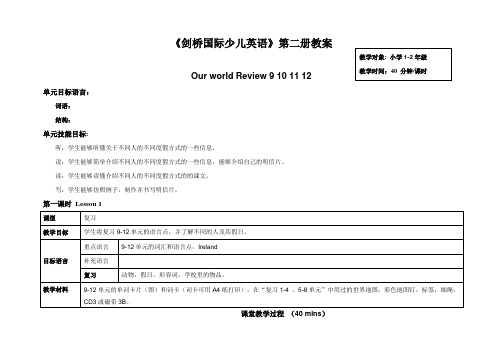
◆练习中进一步巩固课文内容。
◆练习中复习颜色、介词及假日类活动的词汇。
◆游戏中复习四个单元单词的拼写。
Assignment
将今天学习的有关不同的人的不同度假方式介绍给爸爸妈妈听。
教学反思
第二课时Lesson 2
课型
复习
教学目标
学生将复习9-12单元的语言点,并制作一张明信片。
3.9-12单元故事大巡演。教师请学生四人一组,根据他们的意愿选择9-12单元故事中的任何一个故事,进行表演。小组可以改编故事,替换词语,删减难句都可以,只要他们能顺利的表演故事。教师巡视全班,予以必要的帮助。待学生基本准备好后,进行全班的巡演,评出优秀组。
◆学生根据看到的单词卡片的一点信息来猜词。
注:在唱的过程中提醒学生加上动作,声音要大,最好还有向对手挑衅的架势。这样拉歌的效果会更好。
2.教师出示9-12单元的单词卡片(图),学生读一张,就把一张贴在黑板上(横向)。然后教师拿出词卡,请学生Match the words with the pictures.将卡片与黑板上的图片匹配(竖着放在图片的下面)。
1.学生用书第78页,活动2. Match the text.
教师让学生注意看课文。学生两人一组读课文,并把课文和图片匹配起来。小组间互相核对答案,和全班学生一起核对答案。
答案:a 3 b 4 c 1 d 2
2.教师与学生谈论不同类型的假日。让学生说出课文中这些人是在娱乐,还是在帮助别人。问学生是否愿意以帮助他人的方式度假。
CD3或磁带3B。
课堂教学过程(40 mins)
建议时间
教学步骤
教师活动
学生活动
活动设计意图
Min 1-10
开心英语五年级下学期期末总复习unit 12

Play
friends
What is he going to do?
He’s going to ____ _____ ______.
read some book
What are they going to do?
They’re going to have a picnic. 去野餐
They’re going to eat fruit on the picnic.
看见 吹
扫
review 打破
倒塌
坐
拿
来
Unit5 What are going to do today?
Given by Elaine
2014年4月
Guess 猜一猜
Game: What can you see? (你看到了什么?)
take a test
做小测验
Game: What can you see? (你看到了什么?)
去
做
review 难吃的
吃
喝
读 骑
写
唱
Let’s chant
see, saw saw saw 看见
blow,
fall,
blew blew blew
fell fell fell
吹,刮
倒塌
sit,
sat sat sat
坐
break, broke broke broke 打破 sweep, swept swept swept 扫 take, took took took 拿 来
teach by -Elaine
Look, ask and answer.
What is he going to do?
He’s going to take some photos.
三年级英语下册Unit12《Review》 优秀课件北师大版(三起)
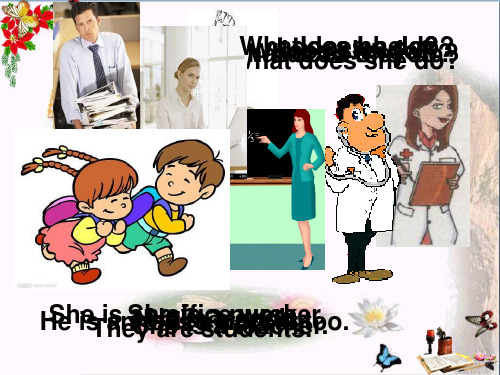
Grammar focus
What do/does … do?
What do your parents do ?
What do you do ? What does the man do? Where do/does ... work? Where does he/she work?
Where do you/they work?
leg, blue, ruler, class, girl
你发现了吗, 红色字母都发什么音呢?
arm mother home from
∕m∕
no in and son aunt knife
∕n∕
England thank sing long pink
∕ŋ∕
leg blue ruler class girl
∕l∕
l
试着读一读下面的单词吧。 time, man, mine, movie, meet, green, think, ten, find, know, think, young, English, sing, help, black, let, long, glass
look after
快速阅读短文, 判断正误。
Read 2a again and answer the following questions. Where does Peter live now?
_In__B__e_ij_in_g_.__________
Where does his father work?
_In__a__h_o_s_p_i_ta_l_.________
( 1 ) Peter is twelve
years old. ( T )
( 2 ) Peter's father is a
- 1、下载文档前请自行甄别文档内容的完整性,平台不提供额外的编辑、内容补充、找答案等附加服务。
- 2、"仅部分预览"的文档,不可在线预览部分如存在完整性等问题,可反馈申请退款(可完整预览的文档不适用该条件!)。
- 3、如文档侵犯您的权益,请联系客服反馈,我们会尽快为您处理(人工客服工作时间:9:00-18:30)。
get up 起床 by ten o’clock 十点之前 make dinner 做饭 the children’s palace 少年宫 too many 太多 + 可数名词的复数 too much 太多 +不可数名词 不可数名词 much too 太
(1) Don’t arrive late for class. (2) We can’t listen to music in the hallways, but we can listen to it outside. (3) —What else do you have to do? -- We have to clean the classroom. (4) --Can we wear hats in school? --Yes,we can/ No,we can’t. (5)-Do you have to wear a uniform at school? -Yes,we do /No,we don’t.
祈使句 通常用来表示命令、请求、禁止、建议、 通常用来表示命令、请求、禁止、建议、警 告等语气。它的主语you(听话人 通常省略。 听话人)通常省略 告等语气。它的主语 听话人 通常省略。 其构成通常有以下几种形式: 其构成通常有以下几种形式
பைடு நூலகம்
1)Be型(即系动词原型be+表语+其他)。 型 即系动词原型 表语+ 表语 其他) 如:Be quiet,please. 否定句Don’t + be+表语 其他。 表语+其他 否定句 表语 其他。 如:Don’t be angry. 2)Do型 ( 即实义动词原形 + 宾语 + 其他 ) 型 即实义动词原形+ 宾语+ 其他) 。如: Open you books,please. 否定句Don’t +实义动词原形 宾语 其他。 实义动词原形+宾语 其他。 否定句 实义动词原形 宾语+其他 如:Don’t eat in the classroom.
Review unit12
school rules 学校规章制度 break the rules 违反规章制度 in the hallways 在过道 listen to music 听音乐 in the music room 在音乐教室里 in the dining hall 在餐厅 sports shoes 运动鞋 gym class 体育课 after school 放学后 have to do 不得不做
9. Complete all assignments neatly and on time. 10. Leave your seat only when necessary. 11. Be quiet in lines, hallways, and restrooms.
12. Obey all school rules. 13. Follow directions. 14.Cooperate with your teachers and classmates. 15. Raise your hand and wait to be called on. 16. Always do your best.
3)Let型 ( 即 Let+宾语 动词原形 其他 ) 如 : 型 宾语+动词原形 其他) 宾语 动词原形+其他 Let me help you. Let’s go at six o’clock. 否定句一般在宾语后加not。如: 否定句一般在宾语后加 。 Let’ not watch TV. 4)No+Ving型( 此种形式通常用于公共场合 型 的提示语中,意为“禁止做某事” 的提示语中,意为“禁止做某事”)如: No smoking! 严禁吸烟! 严禁吸烟! No talking! 不许交谈! 不许交谈! No passing! 禁止通行! 禁止通行! No parking! 不许停车
Classroom Rules 1. No interfering with the teaching and learning of others. 2. Respect personal space, rights and property of others. 3. Follow directions of all your teachers. 4. Come to class prepared with all supplies and homework complete. 5. Be respectful of yourself and others. 6. Raise your hand before you speak during a classroom lesson. 7. Listen quietly while others are speaking. 8. Be polite, courteous, and respectful at all times.
